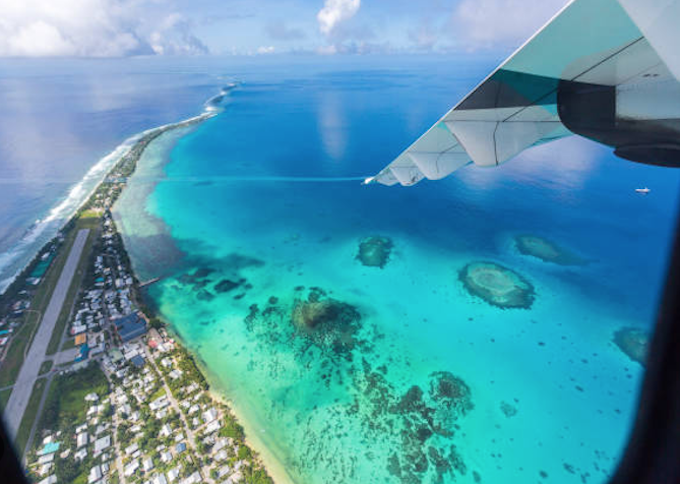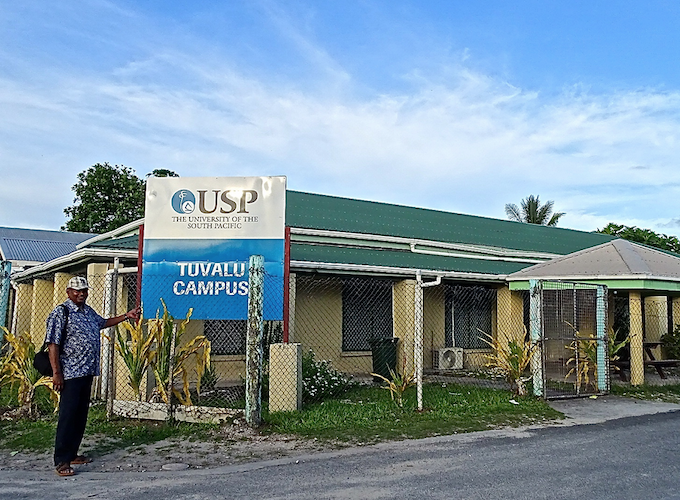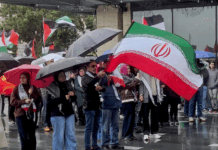
By Kalinga Seneviratne
The University of the South Pacific’s (USP) Tuvalu Campus, located in the capital Funafuti, is perhaps the smallest university in the world, but it offers a distinctive service.
The nation of Tuvalu comprises nine small atoll islands which have a combined population of just 11,400. The Tuvalu Campus itself is restricted to one small building with three classrooms, a conference room, a couple of office spaces and several mobile teaching and learning units.
Regardless of the size of the campus, USP Tuvalu’s campus director Dr Olikoni Tanaki from Tonga is positive about the university’s role and contribution.
In a message on its website, he argues it is the people that “make this campus distinctive and we continuously strive to explore better ways to provide the best services to our communities, and that sustains our distinctiveness”.
In an interview in Funafuti, Isikeli Naqaya, a student-learning specialist at USP Tuvalu, said: “Every semester, the university caters to about 330 students who come from all nine islands.”
He added that some students were based in outer islands and study online, while the majority were based in Funafuti.
The campus was first established as an extension centre in the early 1980s. It is referred to as USP Tuvalu because of the multi-campus nature of USP.
USP is a single university with 11 branch campuses across the Pacific.
It is one of two regional universities in the world — the other is in the Caribbean — and is owned by 12 Pacific Island countries, with Tuvalu being one of them.
USP’s main campus is located in Suva, Fiji, and is known in the region as Laucala Campus, which is also the university’s administrative centre.

Catering to local needs
Tuvalu Campus is basically a regional centre of USP which helps to deliver courses that are designed at the Laucala Campus.
Local students can take certificate, diploma or degree courses of USP via the Tuvalu Campus but they need to register through the central administration at Laucala. USP Tuvalu also offers short courses and workshops catering to local needs.
“The majority of our students do the online mode, particularly those who are involved in degree courses,” Naqaya said. “A majority of those doing face-to-face [courses] are those who do foundation programmes”.
The foundation programmes include the compulsory module, English language skills for tertiary studies, that is taught in-person by Naqaya.
He explains that there are three delivery methods on campus: if there is a tutor available on campus to deliver the programme, it’s face to face. If there is no tutor, it is usually a blended mode or purely online.
Many of the in-person courses are short courses offered as adult education programmes to improve the skills levels needed for the local economy.
“We have just completed one on business communication with our Department of Fisheries here in Tuvalu. It went on for two weeks. These programmes are very popular here.
“Different government ministries and even non-governmental organisations come to us for this type of programme,” said Naqaya. “We have also delivered a course in the small seafood business.”
Fisheries staff
Most of the students for the small business course were staff of the Tuvalu Fisheries Department. USP Tuvalu advertised the course and staff interested in it sent in their applications which went to Laucala campus for selection.
The certificates for the graduates of the short courses are issued by USP in Fiji.
Because it is a branch campus, for USP Tuvalu to deliver a programme, it has to undergo a process. First, the Fiji campus consults with their Tuvalu counterparts to see whether they have a suitable person to deliver the course.
If there is one, Tuvalu receives the course material from Suva and the course is delivered in Tuvalu.
“If we don’t have the specialised staff, like [for a subject such as] cybercrime, for example, we would have someone to come over and deliver it. We first advertise it locally and if there is someone qualified here to do it, they will come and deliver it,” said Naqaya.
“Many of the small courses I have been delivering.”
School leadership programme
On November 27, USP Tuvalu officially launched the Graduate Certificate of School Leadership (GCSL) programme in Tuvalu, marking a crucial step towards empowering the country’s school leaders.
This is a collaborative effort between the USP’s Institute of Education (IoE), the Tuvalu Ministry of Education, Youth, and Sports, and the Tuvalu Learning Project. The GCSL programme was developed in response to a request from Tuvalu, and emphasises the collaborative effort required for success.
IoE director Dr Seu’ula Johansson-Fua, delivering the opening remarks at the launch of the GCSL programme, described it as an uncommon instance of a member country seeking university-designed programmes, and highlighted the institution’s commitment to tailoring education to meet the specific needs of member countries.
The guest of honour for the launch ceremony, Director of the Tuvalu Ministry of Education, Youth and Sports Neaki Letia, highlighted the necessity of the GCSL programme and acknowledged the challenges faced by school leaders in the absence of proper leadership and management training.
“In your role as school leaders we demand reports, we demand . . . attainments. At one point in time, we sit around the table and ask each other, ‘Have we provided proper training for the tools that we ask them to provide?’ and the answer is ‘No, we have not’,” he said.
“So, this is why we requested USP, especially the Institute of Education, for support — to help us contribute ideas and instil knowledge to be a leader,” he explained.
Local research capacity
Another role of USP Tuvalu is to develop local research capacity, especially in local knowledge to tackle climatic change.
Vasa Saitala, a Tuvaluan, was the community research officer at USP Tuvalu until recently. She told University World News that a campus like Tuvalu is important to unite communities as some Tuvaluans have never been to school.
“There are changes due to climate change and through consultations with communities they would . . . learn of what’s happening around us,” she said. “We have to do the studies about traditional knowledge and peoples’ awareness of climatic change, etcetera.”
Saitala has conducted a research project on gathering traditional knowledge about local indicators for different seasons and has developed a curriculum for community training on how to use this knowledge to protect against cyclones, droughts and so on. She has also been involved in a regional project of USP that gathers information about community understandings of climatic change issues.
“USP Laucala outsources the research to us. We do the research here and send the reports to Laucala,” she said.
“For short-term fisheries training and also gender issues, people from USP Fiji come here and work with us.”
Kalinga Seneviratne is a journalist, radio broadcaster, television documentary maker, media and international communications analyst. During 2023, he was a journalism programme consultant with The University of the South Pacific. This article was first published by University World News and is republished with permission.














































